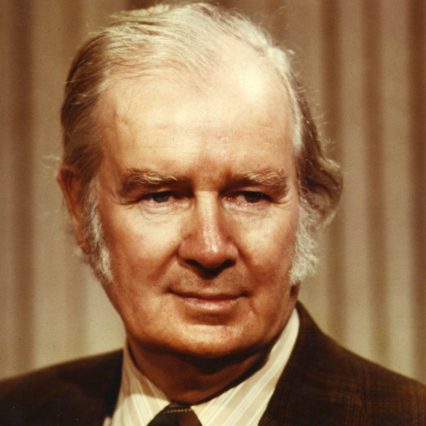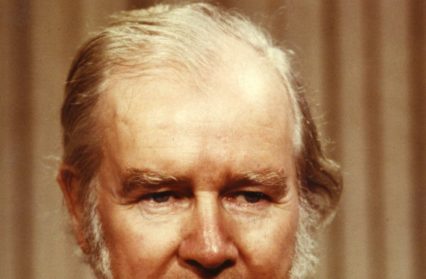Dylan Moore reviews BBC Radio 4’s Gwynfor v Margaret, recounting the story of Gwynfor Evans’ political battle with Margaret Thatcher.
In the week that S4C turns thirty, amid uncertainty about the future of the channel, the BBC broadcast a dramatisation of the true story of Gwynfor Evans’s dramatic political battle with Margaret Thatcher. A writer with over a thousand episodes of Pobol y Cwm and a hundred episodes of The Archers under his belt, Rob Gittins is the perfect man for the job of bringing the concerns of the Welsh-speaking world to the sometimes rarefied atmosphere of Radio 4.
It’s 1979 and Margaret Thatcher’s Conservative party have swept to power with a landslide victory; the new Home Secretary, William Whitelaw (Malcolm Tierney), announces the Government’s intention to abandon a manifesto commitment to a Welsh language TV channel. In response, Gwynfor Evans, the legendary Welsh nationalist and former leader of Plaid Cymru, announces that if Thatcher refuses to keep her promise, he will embark on a hunger strike and, if necessary, starve himself to death.

Image Credit: BBC
‘Like Gandhi I’ll be putting salt and soda in my drinks to keep me going as long as possible,’ says Gwynfor (Robert Blythe). It is a reminder not only of the high-stakes game he was playing, but also his dedication to the cause and the international context in which he saw the struggle for the language. ‘You are not Gandhi,’ he is told at one point. ‘You’re fasting for what? Television? The most sophisticated way man has devised to sell baked beans…’
Gittins brings life to an already dramatic story, which nevertheless ultimately boils down to a war of words, a political duel between the first female British Prime Minister, eager to stamp her mark on history, and Britain’s first Welsh nationalist MP in his twilight years. He does so with a balance between dramatised segments and the voiceover of Eiry Thomas as narrator, calm and yet clearly communicating the passion invoked. Further juxtaposition is provided by background acoustic whimsy and lilting accents evoking the gentle hills of west Wales contrasting with the shrill English voices at the Home Office as well as the softer tones at the Welsh Office, sympathetic to Gwynfor’s cause but committed to persuading him to give up the fight.
As well as the reminder of an important political battle, of long-lasting cultural importance from a Welsh perspective – and from a British perspective an early, rare climb-down for Thatcher – ‘Gwynfor v Margaret’ is a gentle reminder of a completely different techno-cultural era: ‘I do dislike fax machines. Everything’s so immediate. At least the Royal Mail would have afforded us a few days.’
These light touches of humour are born out of the knowledge of what was to come, not only in technology but in politics, as the fallout from Gwynfor’s victory was to help define Thatcher’s premiership. ‘Who knows what kind of Prime Minister Margaret will turn out to be, but I don’t exactly see her giving in to a pensioner from Wales,’ says another confidante of Gwynfor’s. Gittins trades on his audience knowing exactly what kind of Prime Minister Margaret turned out to be (first names are used throughout), and the prescience of the nationalists being joined by Trade Unions, hammering on the PM’s car and throwing eggs. Although the Government promises not to give in to a ‘loud vociferous minority’ nor to ‘violence, threats, blackmail,’ this time there is a U-turn and Gwynfor gets what he wants.
But even before S4C is born, we are reminded of the wider ramifications of this early loss of face for Mrs Thatcher. The programme finishes when we hear the voice of ‘Margaret’ for the first time, not played by an actor but in a recording we have all heard many times before: ‘You turn if you want to… the lady’s not for turning.’
BBC Cymru/Wales production for BBC Radio 4
Dylan Moore has contributed regularly to Wales Arts Review.












